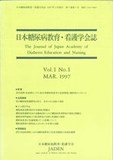Japanese
English
- 有料閲覧
- Abstract 文献概要
- 参考文献 Reference
- サイト内被引用 Cited by
思春期の糖尿病患者の自己管理には,家族特に両親の理解や協力が不可欠であると考えられ,それらが支持的な環境か,非支持的かによって自己管理の成否や糖尿病コントロールの良し悪しに影響すると考えられる.本研究の目的は,思春期・青年前期のインスリン依存型糖尿病患者の家族環境,糖尿病自己管理状態と糖尿病コントロール状態の相互関係を明らかにすることである.対象者は,都内A医科大学小児科糖尿病クリニックに通院する12~19歳のインスリン依存型糖尿病患者46名であり,質問紙による郵送調査を実施した.家族環境はMoosのFamily Environment Scaleを,糖尿病コントロール状態はHbA1cを指標とし,糖尿病自己管理行動項目は,5段階の順序尺度を用意した.その結果,家族の表出性が高い者ほど糖尿病コントロールがよく,逆に葛藤性や管理性が高い者は糖尿病コントロールが悪いことが明らかになった.この関係は,男子に顕著であった.家族の活動的・レクリエーション指向性では,男子は値が高いと糖尿病コントロールがよく,女子では逆に悪かった.また,家族の凝集性が高い者は,血糖自己測定を実行し,運動療法の実行程度が高く,インスリン注射を時間に適切に打っており,家族の組織性が高い者は,自己測定の技術的適切さやインスリン注射の時間的適切さがよく,食事療法の実行程度が高かった.
The purpose of this study was to clarify the relationship between diabetes control and family environment in diabetic adolescents. The subjects were 46 insulin dependent diabetes adolescents aged 12 to 19 years old in the pediatric clinic of “A”Medical College Hospital. Hemoglobin A1c was used as an index of diabetes control and family environment was mesured through the Moos Family Environment Scale which consists of 10 subscales. Significant correlations were found between three subscales, Expressiveness, conflict and control, of the family environment scale and diabetes control. Family expressiveness was correlated with diabetes control, especially for boys. The correlation coefficient was .76. That is, high family expressiveness showed good diabetes control. Family conflict and control were negatively correlated with diabetes control. That is, high family conflict or control showed poor diabetes control. One note is that family active-recreational orientation was positively correlated with diabetes control for boys, but for girls was negatively correlated with diabetes control. The diabetes self-management, that is the level of self-reported insulin injection, self-monitoring of blood glucose, diet and exercise, were positively correlated with family organization. Insulin injection scheduling and exercise were positively correlated with family cohesion. High family cohesion showed good insulin injection scheduling and exercise. And high family organization showed good self-monitoring of blood glucose levels, insulin injection scheduling and skill, diet and exercise. Also, all diabetes self-management behavior, except exercise, was positively correlated with diabetes control. The results of this study suggest that family environment is very important for diabetes self-management and control for adolescents.
Copyright © 1997, Japan Academy of Diabetes Education and Nursing. All rights reserved.


